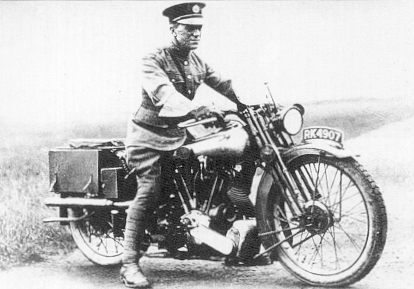
Lawrence of Arabia on his Brough Superior
Strategist of the Desert Dies in Military Hospital
Lord Allenby’s tribute – “Valued comrade”
The Guardian, May 19, 1935
We regret to announce the death of Mr. T. E. Shaw (“Lawrence of Arabia”), which occurred shortly after eight o’clock yesterday morning in Wool Military Hospital, Bovington Camp, Dorset. Mr. Shaw, who until recently was an aircraftman in the Royal Air Force, was injured in a motor-cycling accident on Monday night and did not recover consciousness.
Tragic as it is that such a remarkable career should have been ended by a simple road accident, an official statement issued yesterday shows that if his fight for life had succeeded it would still have been a tragedy, for Mr. Shaw’s brain was irreparably damaged.
Mr. Shaw was 46 years of age.
After a post-mortem examination by Mr. H.W.B. Cairns, the London specialist, the following statement was issued: –
“The post-mortem examination conducted by Mr. Cairns showed such severe lacerations and damage to the brain that in the event of his recovery he would have only regained partial use of his speech and eyesight. In view of the immense activity and energy of Mr. Shaw it is felt that this may be some consolation to those who had entertained anxious hopes of his recovery.”
Another statement issued was: “The funeral of Mr. T. E. Shaw, formerly Colonel Lawrence, will take place at Moreton Church, Dorset, at 2.30pm on Tuesday. The service will be a simple one and no mourning and no flowers are requested. Apart from those specially invited the service will be confined to his particular friends and those who were associated with him in Arabia.
It is understood that there will be no military escort.
When it was realised that the crisis had been reached, Sir E. Farquhar Buzzard, physician-in-ordinary to the King, Mr H.W.B. Cairns, the brain specialist of the London Hospital, and Dr. Hope Gosse, the London lung specialist, were called to the hospital.
Last night’s broadcasts
Tributes to “Lawrence of Arabia” were broadcast from London last night by Field Marshal Lord Allenby and Sir Herbert Baker. Lord Allenby said that in Aircraftman Shaw he had lost a good friend and a valued comrade.
After recalling that they were closely associated in the campaign which opened in 1917-18 in Palestine and Syria, Lord Allenby said: “His co-operation was marked by the utmost loyalty and I never had anything but praise for his work, which, indeed, was invaluable throughout the campaign. He was the mainspring of the Arab movement and knew their language, their manners and their mentality. He shared with the Arabs their hardships and dangers. Among these desert raiders there was none who would not have willingly died for his chief. In fact not a few lost their lives in devotion to him and in defence of his person.
“He was a shy and retiring scholar, archaeologist, and philosopher swept by the tide of war in to a position undreamt of. He had a genius for leadership. Above all men he had no regard for ambition, but did his duty as he saw it.”
Lord Allenby added: “He has left to us who knew and admired him a beloved memory and to all his countrymen an example of a life well spent in service.”
Sir Herbert Baker was unable to be at the microphone and his tribute was read for him. He first met Colonel Lawrence in Oxford shortly after the war and was fascinated by him. “He seemed to radiate a magnetic influence,” said Sir Herbert. “When he last stayed with me about a month ago he pleased us by eating two human meals a day and expressing an ardour to do some great national work.”
Other tributes – Mr Winston Churchill:
In Colonel Lawrence we have lost one of the greatest beings of our time. I had the honour of his friendship. I knew him well. I hoped to see him quit his retirement and take a commanding part in facing the dangers which now threaten this country. No such blow has befallen the Empire for many years as his untimely death. The personal sorrow which all he knew him will feel is deepened by the national impoverishment.